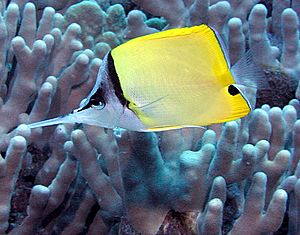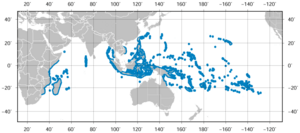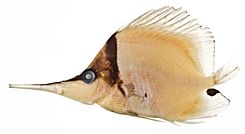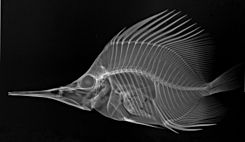Longnose butterflyfish facts for kids
Quick facts for kids Longnose butterflyfish |
|
|---|---|
 |
|
| Conservation status | |
| Scientific classification | |
 |
|
| Longnose butterflyfish range. | |
| Synonyms | |
|
The longnose butterflyfish, also known as the big longnose butterflyfish, is a cool fish. Its scientific name is Forcipiger longirostris. You can find it living on coral reefs in warm, tropical waters. These waters are mostly in the Indo-Pacific region. This fish is easy to spot because of its very long, pointy nose! But sometimes, people confuse it with its close relative, the Yellow longnose butterflyfish. Both of these fish are sometimes kept in home aquariums.
Contents
What Does the Longnose Butterflyfish Look Like?
The longnose butterflyfish has a flat, yellow body. Its head has a black triangle shape. As its name suggests, it has a long, silvery snout that looks like a nose.
Key Features of the Longnose Butterflyfish
This fish usually has 10 or 11 spines on its back fin. It also has a black spot on its anal fin. You might see small black spots in rows on its chest area. The longnose butterflyfish can grow to be about 22 cm (8.7 in) long.
How to Tell it Apart from its Cousin
It's easy to mix up the longnose butterflyfish with its cousin, F. flavissimus. But there are a few differences. F. flavissimus has more spines on its back fin. It also doesn't have the black spots that the longnose butterflyfish has. Plus, the gill cover (called an operculum) on F. flavissimus is more curved.
Rare Color Forms
Sometimes, you might see a longnose butterflyfish that is all black. This is very rare! The yellow part of its body can also sometimes be brown instead of yellow.
How the Longnose Butterflyfish Behaves
The longnose butterflyfish is active during the day. This means it is a diurnal fish. It is also an omnivore, which means it eats both plants and animals.
What the Longnose Butterflyfish Eats
This fish mostly eats small crustaceans, which are like tiny shrimp or crabs. It also enjoys eating the tube feet of echinoderms, like sea urchins. Sometimes, it will eat the tentacles of polychaete worms.
Mating and Life Together
Like many other types of butterflyfish, longnose butterflyfish mate for life. This means they choose a partner and stay together.
Interesting Facts and History
The longnose butterflyfish, along with its cousin F. flavissimus, has a very long name in the Hawaiian language. This name is lauwiliwilinukunukuʻoiʻoi. It means "long-snouted (sharp-beaked) fish shaped like a wiliwili leaf."
First Scientific Name in Hawaii
This fish was the first Hawaiian fish to get a scientific name. This happened when Captain James Cook collected one of these fish. That fish is still kept in the British Museum today!
- Photos of Forcipiger longirostris in iNaturalist
See also
 In Spanish: Forcipiger longirostris para niños
In Spanish: Forcipiger longirostris para niños




